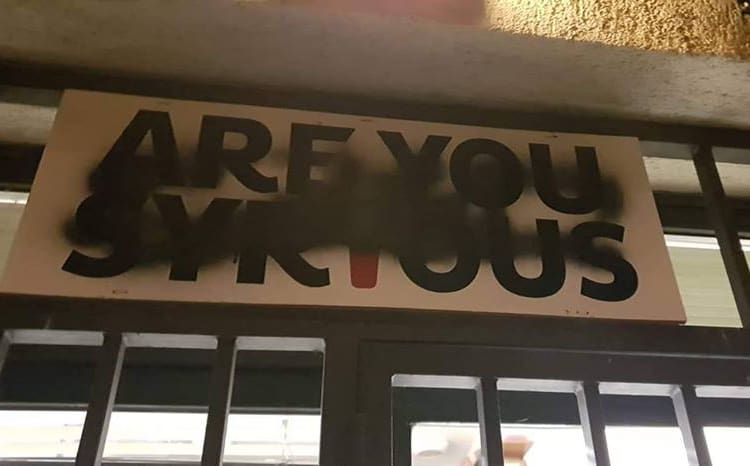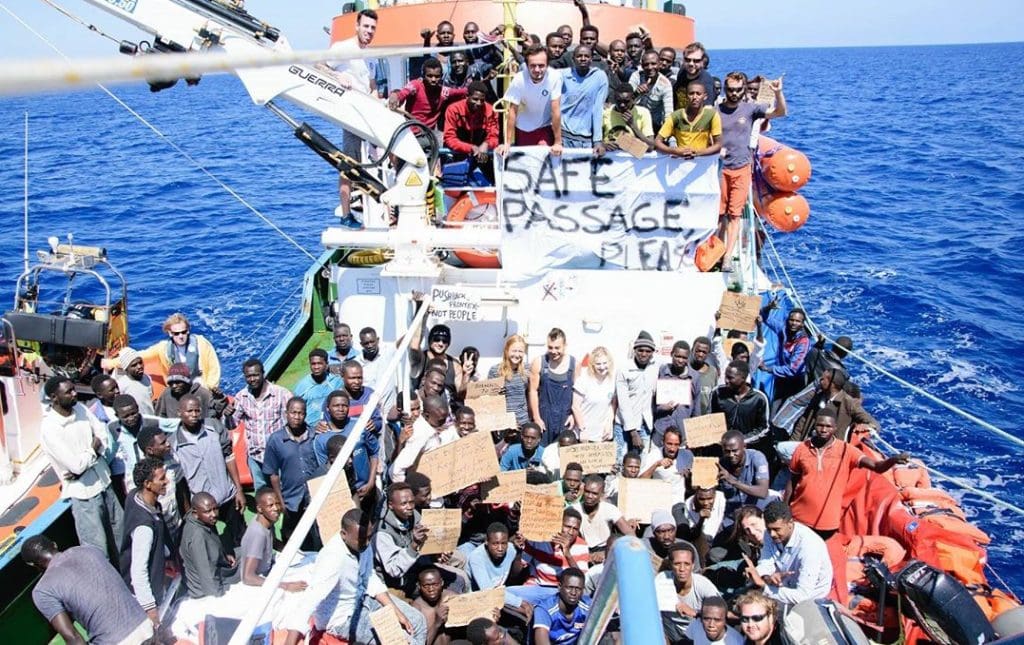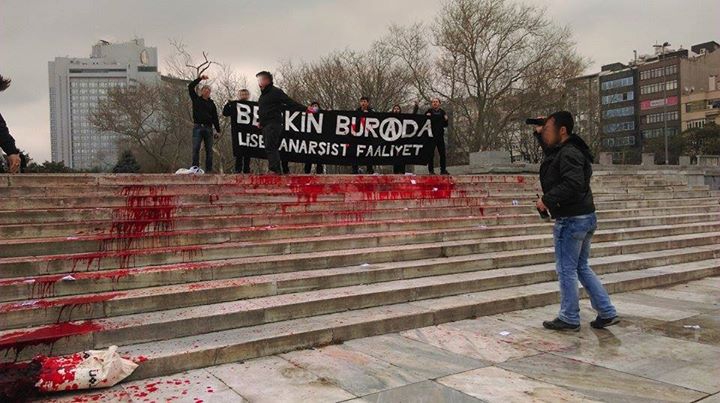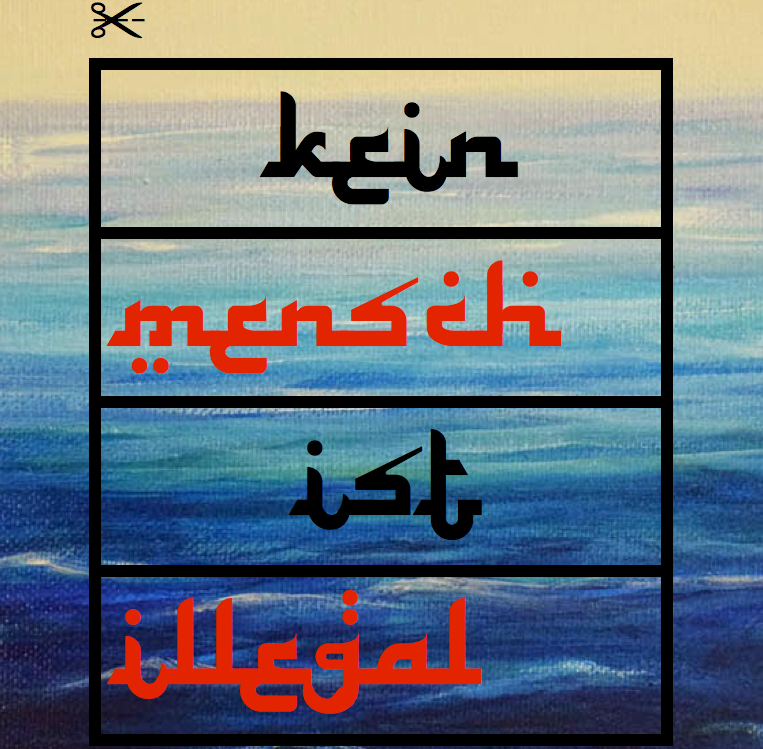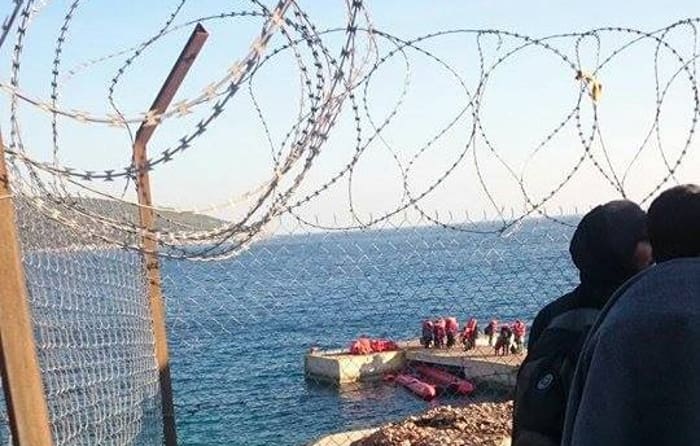AntiNote: Happy New Year. We return to our regularly scheduled program after a couple months of dormancy with the authorized republication of an important dispatch from Zagreb.
It has been an eventful time since our last post, even just considering the world of migration and the subcultural ecosystems of refugee solidarity and resistance to border violence. It would be impossible to sum up completely everything that has happened in the meantime on the fortified borders of the so-called West—the US, Europe, and Australia—or the continuing deteriorations and depredations in migrants’ countries of origin which are still driving millions into its callous machinery.
Amid the accelerating churn of ecological disaster, economic deprivation, and military devastation, there are still countless humans dedicating themselves to the amelioration of the suffering it causes—and facing as a consequence the jackboot of states dedicated to preserving (and obscuring from view) the cruel structures that underlie all of it: white supremacy, nationalism, capitalism, hetero-patriarchy, authoritarianism of all stripes.
Last week in the US, four comrades from the humanitarian organization No More Deaths were convicted of “crimes” amounting essentially to littering and trespassing, after having left water jugs and other aid supplies in the Arizona desert, and they (along with five others yet to be tried, one of whom is also accused of trafficking-related activities) are facing time in federal prison.
This has thankfully made for mass media headlines and outrage across the world, but as our friends at Are You Syrious? point out at the top of their article here, this is only the tip of the iceberg when it comes to what humanitarian volunteers are up against in all their attempts, large and small, to save lives and resist the anti-human border apparatus. This is happening all over, on every border—land and sea—and in every metropole.
The paradox, of course, is that humanitarian organizations generally have to calculate and compromise when it comes to publicizing the threats and repression they face; if they get too out-front about it, their entire operations could simply be folded up and put away, which is obviously no good for nobody. We saw this firsthand in the Balkans already in 2015, and are hearing highly distressing stories from comrades in Lebanon right now as well: even after the devastating winter storms and flooding there, the state wants aid workers out so they can proceed with forcibly repatriating Syrian refugees to a country that is anything but “safe.” You heard it here first. One false move…
We therefore applaud Are You Syrious? for their courage in coming forward with this account, and we thank them for their kind permission to spread the word to our readers.

When Governments Turn Against Humanitarian Volunteers
by Are You Syrious? (Croatia)
30 December 2018 (original post)
In 2018, we witnessed unprecedented backlash against human rights defenders who have been advocating legal access to the asylum system in the EU. Volunteers and NGOs have been threatened, attacked, and legally prosecuted for crimes they didn’t commit. Are You Syrious? (AYS) is one of them. For the first time, we are publicly disclosing our own case to paint the full picture of events on Europe’s longest land border.
Looking back at the rapid change in the European attitude toward refugees and migrants and the radical turn of most member states to the right-populist political spectrum, it was just a matter of time before human rights defenders became targets, just like the ones they were trying to defend.
In 2016, Karolina Krist and Michael Bakas described the situation on the Greek frontier islands, precisely predicting what would soon be happening throughout Europe:
Fishermen who rescue refugees from the sea can be charged with aiding illegal immigration. Volunteers who cook in public spaces can be charged for not having secured public health permits. Volunteer doctors can be charged with working in Greece without having had their licenses reviewed and approved by the national government. Volunteers who pitch tents in public spaces can be charged with violating laws forbidding camping in public spaces. Volunteers who help to change the wet clothes of shivering children might be charged with molesting them. Photographers could be charged with violating military space on the coastlines. Those who donate food, clothing, and other supplies could be charged for not providing receipts. And finally, volunteers choosing to work in small groups without large donor bases, high overhead, bank accounts, and tax numbers can be prohibited from offering to help.

This past year brought some of the most shameful examples of the backlash against volunteers and NGOs in modern history. Sometimes, governmental pressure even led to the further endangerment of people’s lives. Obstruction of sea rescue missions in Italy, Malta, and Greece have been covered extensively both in our daily updates as well as in various mainstream media outlets. But 2018 also brought a ray of hope: three Spanish firefighters and two volunteers from Denmark who rescued refugees off the coast of Greece in 2016 were cleared of wrongdoing in May, after two years of humiliating struggle to prove that rescue missions cannot be considered human trafficking.
Meanwhile, criminalization of solidarity has proven to be a much wider phenomenon than just a few high-profile cases. It is happening across the European Union and often goes unreported. Those who are still present in the field are facing the backlash on an almost daily basis.
Aude de Coustin, in her recently published paper “Criminalisation of Solidarity in France: A General Overview,” wrote:
Loan Torondel, a young volunteer from the association “L’auberge des migrants,” was found guilty of defamation (and later sentenced to a 1,500-euro fine) in September 2018 by the tribunal of Boulogne-sur-Mer in France; because of a tweet, published in January, with a picture of policemen in Calais, suggesting that they were about to take the blankets away from migrants. This event may seem extreme, ridiculous, or tragic, but sadly it has become the norm for migrant helpers in France.
While most eyes were pointed towards the sea, criminalization became a growing problem on Europe’s terrestrial frontiers. It is especially felt in Croatia, where AYS has been directly targeted and even taken to court by the ministry of interior, which requested the ban of our work in Croatia. We have decided to publish the overview of our case for the first time, to paint the full picture of events at Europe’s longest land border.
Note: While focusing on our story as an example of criminalization of solidarity, we’re painfully aware that our case is not isolated and many other groups are facing similar struggles.
How it started in Croatia: the case of little Madina
AYS has been active in the Balkans since the summer of 2015, when we first gathered as a group of independent volunteers. We have been active in most European and Balkan fields, with a main focus on Croatia and surrounding countries. In the morning hours of 22 November 2017, we were contacted by colleagues on the Serbian side of the border, who informed us of the death of little Madina, a six-year-old girl from Afghanistan who had been illegally pushed back to Serbia with her family.

Like so many times before, Croatian policemen had forced the group to follow train tracks towards the Serbian town of Šid. Little Madina never made it. She was killed by a train only two hundred meters away from European soil, where her family’s request for asylum had been brutally denied by Croatian border police officers. AYS was the first group to inform the public about the tragedy. We also brought suit—and, faced with a criminal complaint filed on behalf of Madina’s family with the help of AYS and Center for Peace Studies (CPS), the ministry of interior responded brutally. Instead of providing answers, they decided to attack the NGOs that were raising questions about the criminal treatment of refugees at our borders.
Volunteers portrayed as smugglers in parliament
Following our public advocacy around pushbacks and little Madina’s case, a member of Croatian parliament, Pedja Grbin, asked for the government’s clarification on the events described in our reports. In a letter that was then sent to all members of parliament on 22 March 2018, Croatian minister of interior Davor Božinović claimed, baselessly, that our volunteers were “handing out telephone numbers, instructions, money, and directions on how to enter Croatia” to people who were located in Serbia, which could be seen as encouraging and helping them to “illegally” cross the border. His letter was shared by almost all mainstream media in Croatia.

Of course, these accusations were completely false, and we could only interpret them as an attempt to create a negative perception among potential allies as well as the broader public, by equating our work on human rights protection with criminal acts. Neither instructions on how to enter Croatia, nor directions, nor money have ever been distributed by our volunteers and we strongly reject these allegations.
As regards the accusation that we have provided refugees with our contact information, which is publicly available anyhow: this points to a strange expectation on the part of the ministry that people should be left in complete ignorance and concealment about how they can exercise their human rights. This is in contradiction of the very idea of human rights protection, since informing people about their rights represents the first step in their realization.
In this context, we must point out that we were never formally accused of committing any criminal act, so these accusations are in fact acts of public defamation that only intend to criminalize solidarity, discourage volunteers from legally supporting asylum seekers, and deny human rights to people who are refugees. This is in complete contravention of international and regional human rights standards.
Nonetheless, in early April 2018, the ministry raised a misdemeanor charge against our volunteer Dragan Umičević.
Ministry asks for ban of AYS, prison for the volunteer who supported little Madina’s family
Our volunteer was charged with committing a misdemeanor under Article 43 of the Foreigners Act, which prohibits providing assistance to a third country national. The charges stated that he helped third country nationals illegally cross the Croatian-Serbian border.

The penalty requested by the ministry was threefold: maximum jail time, a fine amounting to 43,000 euros for Dragan—and prohibition of a legal entity, the one he volunteers for, from conducting specific work or business. This last proposal was, presumably, intended to prohibit the further work of AYS, but it was not taken into consideration by the court since it was out of place, legally, in a proceeding against a natural person. The third country nationals mentioned in the charges, by the way, were no other than the family of little Madina.
On 8 March 2018, just over three months after Madina’s killing, we were contacted by her brother through our public Facebook page. He said he was once again in Croatian territory with his family and that they wanted to ask for asylum, but they were understandably afraid of the police. They were in a group of thirty-six people, most of them children and minors. Like many times before, we had to explain that the only legal way for them to stay in Croatia is to approach a police officer in the field and formally express their asylum request. We immediately contacted the police ourselves, telling them about the family’s presence in the country and their wish to ask for asylum. Despite this, they ended up being threatened and pushed back again, in the same way that had gotten their little sister killed only three months earlier.
The next time they contacted us was during the night of 20-21 March 2018. This time it was Madina’s sister, who said that the family was again in Croatia, this time in a group of fourteen, eleven of them children and minors. They confirmed their presence in Croatia by sending us their geolocation—a procedure developed specifically to ensure we aren’t talking to anyone who is attempting to illegally cross the border, in order to avoid any possible misinterpretation of the nature of our work. This time, one of our volunteers—Dragan—was an hour away from the spot where they entered Croatia, and we asked him to be present when they met the police, since they were frightened they would be pushed back again.

Dragan’s instructions were simple: he was to approach the nearest police checkpoint in the field and to inform officers on duty about the presence of the family and their wish to ask for asylum. He never had any direct contact with Madina’s family prior to or after their arrival to Croatia. All correspondence was done from our headquarters in Zagreb, and Dragan went to the field only in order to monitor their access to the asylum system once they approached the police themselves.
Madina’s family was immediately put into detention there and ended up being held, without access to legal assistance, for months. According to their own statements, they were forced to sign documents they didn’t understand—one of them an incriminatory statement against AYS. The European Court of Human Rights issued two interim measures ordering the Croatian state to release the family from detention and to allow their selected lawyer to visit them. They never got the chance to be granted international protection in Croatia. In the end, they (again, understandably) absconded.

Among the evidence presented by the ministry of interior in the proceeding against Dragan was the testimony of three border police officers who had been monitoring the Croatian-Serbian border at the time our volunteer went to the village and to whom he had first turned for support in reaching out to the family (who, again, were already on Croatian territory). Additional testimony was presented in the form of a statement by another young member of the refugee family—a statement which was taken the night the family entered Croatia, without the presence of a lawyer or legal guardian, and in a language the witness does not speak. This evidence was, of course, dismissed by the court.
Considering that Dragan went to support the family only after they had confirmed their position on Croatian territory, and that we had firm written evidence to prove that, we were confident that Dragan would be cleared of all charges. In the court, it was proven beyond doubt that the family was already in Croatia when they contacted us. The verdict itself also clearly states that Dragan had no direct contact with the family and no intention to facilitate illegal activity. However, in September the court found our volunteer guilty based on “unconscious negligence,” saying that he should have assumed that the family wasn’t in Croatia. Despite the proven fact that they were.
Dragan was sentenced to pay a fine in the amount of 8,000 euros. We have filed a complaint to the high misdemeanor court in relation to this decision, and the process is ongoing.
Although the national media did not report on the court proceeding at all, only a few hours after the judgment was announced, it appeared on a state news portal, indicating that the ministry of interior had informed government-paid journalists of the judgment. However, the news reporting did not mention that the foreigners to whom our volunteer had allegedly provided assistance were the family of Madina Hussiny, or that the group had included eleven minors. Also, it did not quote the verdict itself, but instead listed all the charges—most of which had been dismissed by the court.
This is how the ministry not only harmed the reputation of AYS, but also sent a strong message to the Croatian public that providing help to migrants and refugees will be punished. Since then, the ministry has continuously misquoted the verdict in order to give the false impression that our volunteer had actually assisted an illegal border crossing, which was in fact found by the court to be untrue.
Defamation campaign triggers outbursts of violence against AYS
This public defamation of our NGO has led to several anonymous attacks to our premises in Zagreb, Croatia. Our van was smashed with concrete blocks. The windows of our integration center were shattered. Insulting graffiti was sprayed all over our building and the van. All of the mentioned incidents were reported to the police, but no one was ever found responsible for the attacks.

Among the many threats we’ve received, the most disturbing was a direct death threat, on the open street, from a war veteran and civil servant who had been harassing AYS employees and volunteers for months. This incident was reported to the police, and the state’s attorney then issued a restraining order under which this man is forbidden to approach any of our employees any closer than fifty meters. We have also been threatened online by various individuals who quote misinformation published by the ministry of interior as their justification to attack us. In addition, we have reported one death threat in particular that was sent to our NGO by a person himself working for the ministry of interior (or at least this is the employer listed on the public Facebook profile from which he sent the threats).
Following these incidents, AYS employees were advised by the police to buy pepper spray and always carry it with them. One was also advised always to accompany her child to and from school. Due to this, AYS has shortened working hours and introduced a rule that nobody stay alone in the office after dark.
During periods of increased arrivals from Bosnia and Herzegovina—of people seeking international protection in Croatia but too afraid to go alone to police stations due to their experiences of pushbacks—we have noticed an increased police presence in front of our office and integration center in Zagreb. One example was a two-week period in May 2018 and another spanned October and November 2018. The AYS office and center provides social support, information, and humanitarian aid (free clothes and hygiene items) to asylum-seekers and asylees. During these periods, our visitors were stopped and registered (their personal information recorded) by the police without any explanation. This whole process looked like racial profiling, since for example people dropping off donations were not registered. This frightened many of our visitors, who stopped using our services, and brought distrust to our neighbors, who were alarmed by the presence of uniformed police officers and police vehicles.

Sometimes the police officers would be present in front of our offices the entire day, and sometimes only at certain hours. Sometimes they would come in uniform, in police cars, and sometimes they would come in civilian clothing and regular cars, and stand very close to our office. On one occasion in October, a police officer entered our integration center without explanation and without presenting himself, and asked a refugee visiting us—in a very rude way—to say who he was. On another occasion, police officers entered our offices with no introduction whatsoever and asked for all of our IDs, but refused to explain why they were there or if anyone did anything wrong.
Although we could be asked to assume that their presence had to do with the attacks on our office, based on the general atmosphere and the attitude of police officers who were present in front of our premises we are convinced that it was primarily a form of surveillance and intimidation.
AYS volunteers threatened in police stations
In addition to the public defamation that we are currently being exposed to by the authorities, our volunteers have been encountering individual pressures from police for a long time now. Namely, many times they have been detained for several hours in police stations although there were no formal charges brought against them; questioned in an inhumane and degrading way; and yelled at and intimidated (for example by stating that the police were familiar with a volunteer’s whereabouts during his or her private hours).
The following examples are illustrative of the pressures we have experienced recently.
In mid-February this year we were contacted by a large group of refugees (a group including many children and one pregnant woman) who informed us that they were on Croatian territory and wished to seek international protection—and also that they were in need of medical assistance. We informed the competent police station in the county located on the Croatian-Serbian border, and a volunteer also went to the field in order to be present when the asylum seekers met the police officers. However, when he approached the officers present on the field and identified himself, he was taken to a police station, where he then waited for four hours to be interviewed by a crime unit inspector. His cell phone was taken away from him for several hours so he was not able to contact anyone, and he was guarded by a police officer. During the interrogation, the inspector who questioned him suggested that NGOs who assist refugees have their own “interests” in the situation. The inspector also insisted that AYS should not publicly speak about pushbacks on the Croatian border, and used humiliating language to describe our organization. He repeatedly warned our volunteer against cooperating with us. The volunteer was released without any charges brought against him, but the whole process lasted for six hours.
Volunteers detained for hours without explanation
Another volunteer who went to a police station in the Croatian capital—in order to be present when a refugee submitted a request for international protection—ended up being detained there for eight hours, from four p.m. to midnight. During that period, no formal accusations were brought against her, but she was threatened with criminal charges. Without examining the refugee’s claims or considering his request for asylum, the inspectors instead repeatedly insinuated a previous connection between the volunteer and the Pashto-speaking refugee who we had previously never heard from. They openly repeated that “this has criminal elements, beware, don’t go anywhere, we will question you again”—and did so three more times, aggressively and without paying the slightest heed to the information being presented by the refugee (to whom they spoke in Croatian).

Indeed, the volunteer went on to be questioned by yet other inspectors (presumably from the intelligence service or the ministry of interior’s criminal division), but was not told clearly what law she had broken, or why she was being questioned, or what they suspected her of having done. The approach of the chief inspector and his mode of communication were far from appropriate. Warnings were given several times against further volunteering activities and against helping those who needed assistance by accompanying them to the police (nevermind all those who have gone unaccompanied and were quietly expelled from the country with no documentation of their cases). No document was given to the volunteer after her questioning, she was denied information on what would happen to the asylum-seeker, and around midnight, she was escorted from the precinct so she would not be present for the outcome of his visit.
Attempt to stop a press conference by calling people in for questioning
In April 2018, together with the Center for Peace Studies (CPS) and our lawyers, we announced a press conference in order to speak out about the pressure from the ministry of interior. In response, the ministry summoned our employees, specifically those who were announced to speak at the conference, in for questioning—for the exact time when the press conference was scheduled. This was an obvious attempt to intimidate them and prevent them from speaking publicly. They delivered their summons by appearing at the employees’ private addresses at night, only hours after the press conference had been announced, causing concern and distress for their families. The most absurd detail of it all: they were being summoned to the police station to be questioned about little Madina’s case. Finally, following the press conference that was held nevertheless, the minister of interior himself made public statements presenting our work as directly undermining the Croatian goal of entering the Schengen system, and also directly accused us of encouraging people who are currently in Serbia to illegally cross the Serbian-Croatian border.

A volunteer with disabilities humiliated and yelled at for monitoring access to asylum system
On several occasions last August, asylum-seekers approached our volunteers in front of the Porin reception center in Zagreb, where we organize integration activities and educational programs for children. They said they had recently arrived to Croatia from Bosnia and they wanted to ask for asylum, but they were afraid of the police. All of our volunteers followed our protocol and told them they should ask for asylum at the nearest police station. On three occasions, a volunteer (who is a person with disabilities) went along to the police station to monitor the process. She was humiliated, yelled at, and threatened by the police officers on duty, who told her that she could be criminally charged just for coming to the police station. She was then forced to translate to the refugees on behalf of police, to tell them their small children will have to sleep on the cold cell floor. Later, after she brought food to the children, she was told that her presence in the hall was interfering with police business, and was forced to leave the police station.
Who is allowed to provide legal support?
Very soon after this, our NGO was unofficially warned that we would be expelled from the Porin reception center, and our contract with the ministry was said to be “lost.” It was made very obvious that this threat was connected to our monitoring activities with the people who had tried to seek international protection in front of the center. After we presented copies of our valid contract with the ministry, we were allowed to continue our integration activities at the center, but our partner organization, CPS, which provides free legal aid to the refugees, was expelled. When journalists asked them to explain this decision, the ministry again misquoted the verdict against Dragan, equating our work with criminal activities.
Female volunteers turn to police for help and are threatened with rape
We have also had negative experiences in situations when we reported a problem to the police. In February 2018, we turned to them for assistance upon hearing that our contact information (a link to our official Facebook page) was being sold by a smuggler to refugees in Serbia. After there was no reply to a inquiry submitted via email, our volunteers approached the police station in person, but even then our complaint was not formally received or recorded.

Moreover, the police officers who talked to us acted very unprofessionally. They questioned our volunteers in the lobby, and did not state their names or take any personal identification from the volunteers. After the police inspector on duty repeatedly refused to formally register our arrival, a lower-ranked officer said he would take our names “for his own sake.” Meanwhile, the inspector told us that we shouldn’t have filed a report about the alleged smuggler via email, and that we were “endangering ourselves and others around us.”
In addition to that, the chief inspector was disrespectful both towards us and the work that we do, as well as towards refugees in general. During the conversation, he made offensive and racist remarks explicitly equating refugees with criminals, and also made comments about how our female volunteers are going to get raped by refugees.
Note from AYS: It must be said that several recent incidents have not been described in this report because volunteers were afraid of additional problems with the police if they report mistreatment.
We strive to echo correct news from the ground through collaboration and fairness.
Every effort has been made to credit organizations and individuals with regard to the supply of information, video, and photo material (in cases where the source wanted to be credited). Please notify us regarding corrections.
If there’s anything you want to share or comment, contact us through Facebook or write to: areyousyrious@gmail.com.
Reprinted with permission. Lightly edited by Antidote for clarity.

